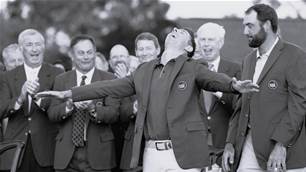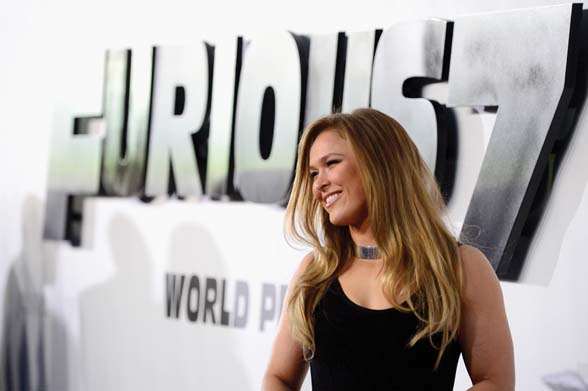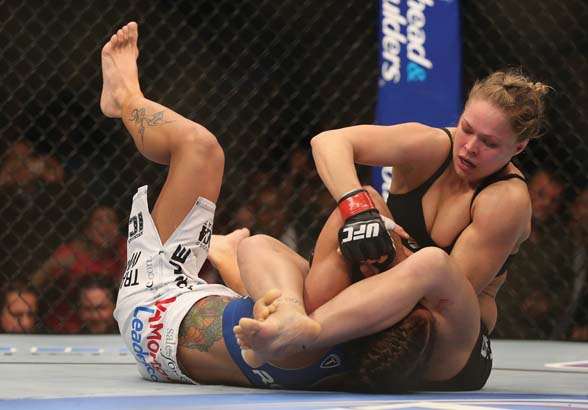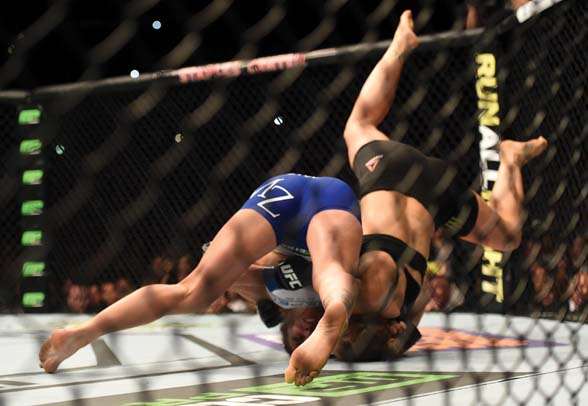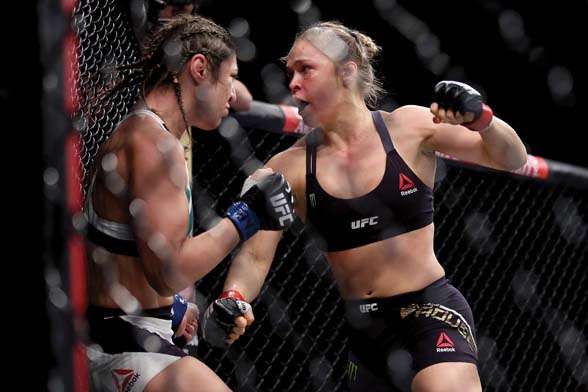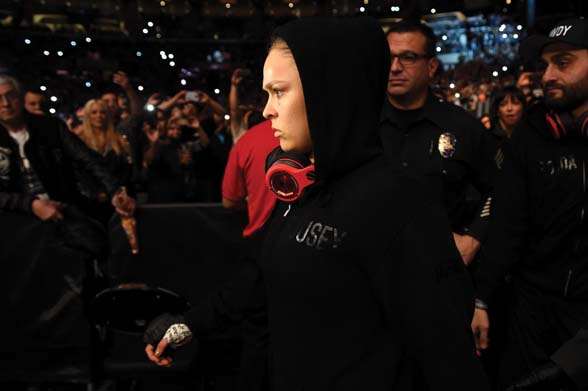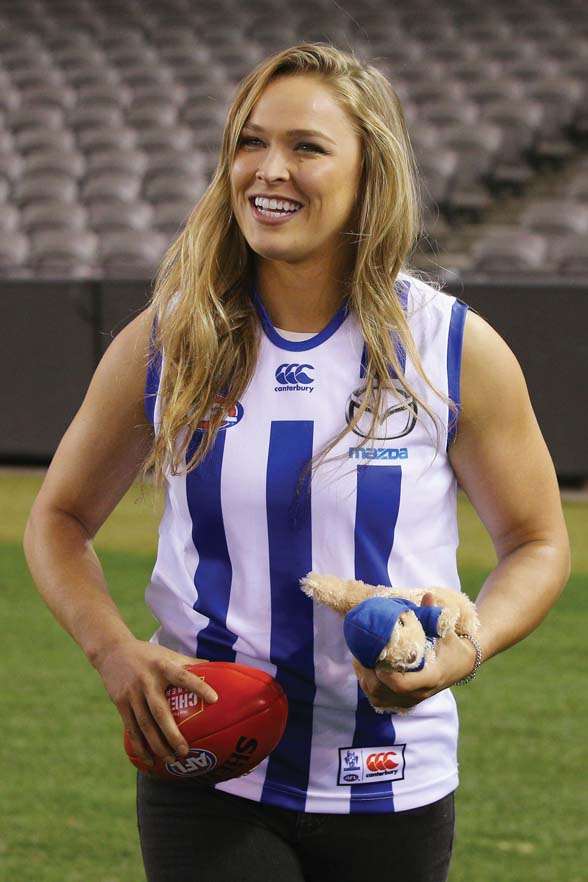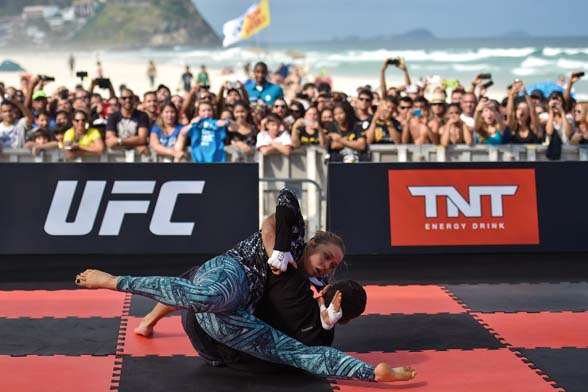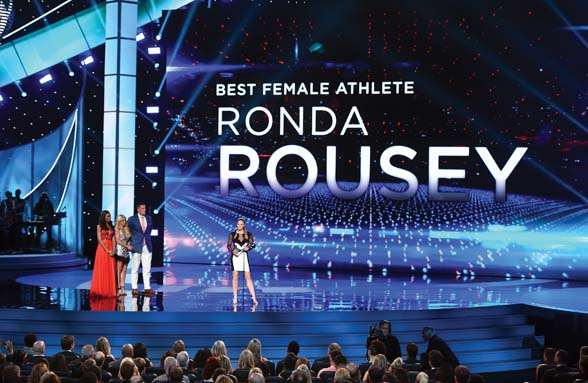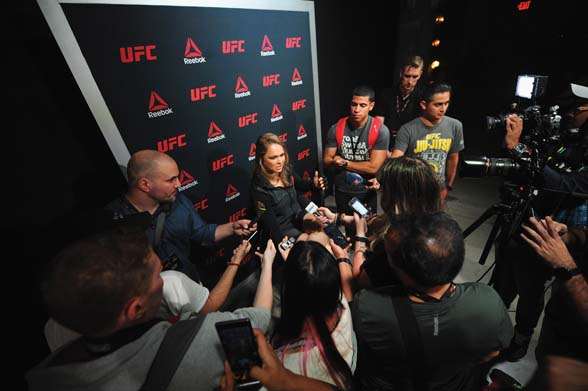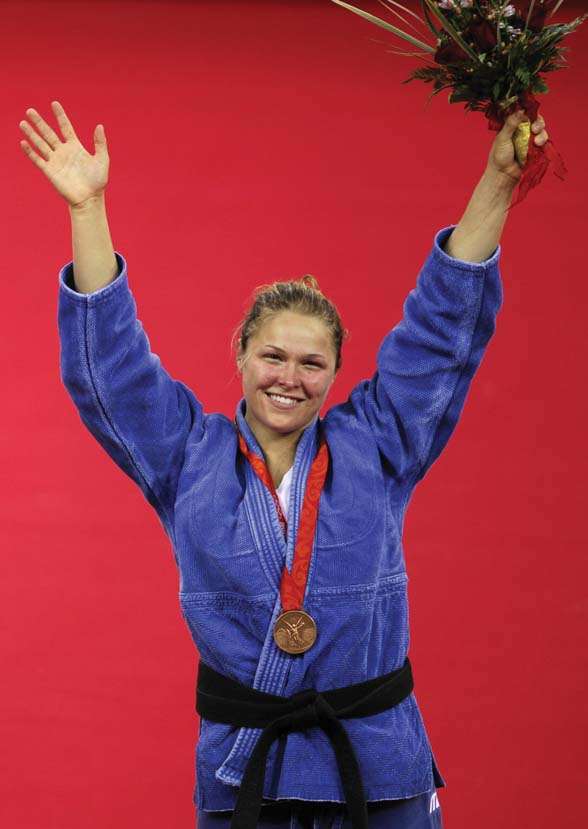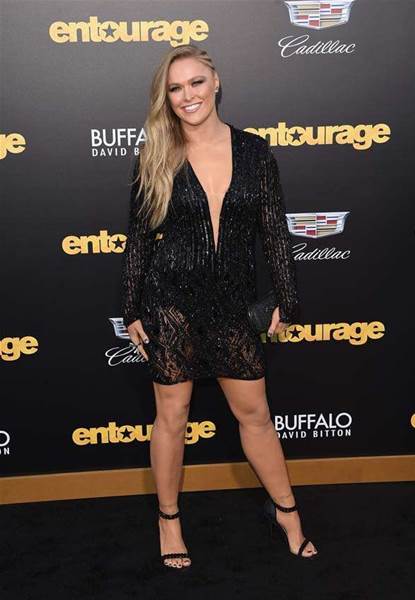Superstar Ronda Rousey headlines UFC event in Melbourne.
Ronda Rousey is hosting a revolving door of journalists at Sydney’s Darling Hotel. Inside Sport is next: we've been assured 15 minutes’ one-on-one with her. This is equivalent to the total time she has spent in the UFC octagon during the course of all 12 of her professional fights. Those undefeated 15 minutes (and six seconds) have propelled her into a rare kind of stratospheric global superstardom. Now she’s here on a promotional tour with her “boss”, UFC promoter Dana White.
We are ushered down a dimly lit hallway – away from the clammy-handed journalists, bustling caterers and nervous chuckles – and into a bright room.
Rousey is seated on a grey couch with a knitted blanket pulled up to her waist. Your author uses the side of his jeans to surreptitiously wipe the sweat off his palm before we shake hands.
Her make-up artist opens the conversation. “Oh, sorry, one second. I’ll fix that up for you, Ronda,” she says, looking to touch up some microscopic flaw on her face.
“Ooop, sorry, I fucked it up again!” laughs Rousey, as she tilts her head backwards, frowning her mouth to stretch the skin tighter to allow for the adjustment. “I’m still so bad at this.”
I shuffle my notes and press record. Her eyes flash to my hand. “Is that The One ring?” she asks, child-like, pointing to my adorned thumb. I look up to her beaming face. This is an athlete who quotes Lord Of The Rings to and from training, and she has spotted a connection. And suddenly I relax. It has taken 20 seconds.
UFC boss Dana White says it took Rousey 15 minutes to convince him to open the 135 women division in the UFC. “No one else could have done it,” he says. It’s a point he has repeatedly stressed. It was only back in 2011 that he declared no women would ever compete in the UFC. Now, just four years later, Ronda Rousey is headlining UFC 193 with her seventh UFC bantamweight belt defence (Joanna Jedrzejczyk’s third strawweight belt defence is set as the co-main event). Two title defences, both women. And it’s all happening on November 17 at Etihad Stadium, Melbourne, an event primed to break all UFC attendance records.
White is appreciating the irony. “I knew Ronda was special right away. That’s why I did it,” he assures Inside Sport when we meet. What makes her special? “I don’t know. It was everything. No one else could have done it ... she’s one in a million ... She’s a real fighter ... ”
Real fighters bring more to the game than just their fists. They arrive with a rich narrative and force irrevocable change in the fight game. Rousey – like all fighting greats – has that ineffable thing; that thing that people want to rally behind; that thing that brings ordinarily disparate people together. “I’m not here to be liked,” she has said. “I’m here to make you care.”
Her last fight was back in July at UFC 190, in Rio de Janerio, and was preceded by an open workout held at windy Pepe Beach. As Ronda loosened up, entire families vied for a spot to watch the ESPY awards’ “Most Dominant Athlete Alive”. Many of those in attendance watch the open workouts because they can’t afford a ticket for the fight that Saturday night. But for these fans, a glimpse will do. Maybe an autograph ...
Ronda pawed the air and every now and then turned her body toward the onlookers and flickered a bashful smile. Her presence set off a chemical reaction in the crowd, and they erupted into hollers of “Honda, Honda, Honda!”
She has this uncanny effect on people. This kind of support for a foreign opponent taking on a Brazilian? It never occurs. It’s one of the natural laws of UFC: punches hurt, never leave a fight to the judges, and Brazilian fans always root for the Brazilian.
The home advantage was meant to favour Rousey’s opponent for UFC 190, Bethe Correia. Correia expected to leverage the roaring passion of her Brazilian nation in the lead-up to the bout and crush Rousey with it on fight night. But at that open workout, it became starkly apparent that the veneration was emphatically swayed in Ronda’s favour. For Bethe – the bantamweight title hopeful – this was very bad news.
“Honda, Honda, Honda!”
Rousey began to shadowbox with her coach, Edmond Tarverdyan. Edmond wrapped Ronda’s hands before the workout, as he always does: thicker than he would for fighters, due to their delicacy. This time he picked up a black marker and carefully penned “My Lovely” on her right hand and “Father” on her left hand, at Rousey’s request. Ron Rousey – Ronda’s father – was the first person to recognise and assure the little girl of her dormant greatness. Ronda couldn’t speak until she was six years old due to a communication disorder called apraxia. Ron Rousey told Ronda that she was a “sleeper” and that one day she would wake, and then everyone would be able to see what he could see. Then, when Ronda was just eight years of age, he committed suicide.
“I have the right to be here” she would tell herself as she was getting tossed around by elite judoka at age 11. “I have the right to be here” was the thought she recalled while drilling the bag in the Glendale Fight Gym, day after day, until she forced Tarverdyan to take her seriously. “I have the right to be here” was the thought that energised her in her UFC 157 debut against Liz Carmouche in front of thousands of people who didn’t think that women had a place in the UFC.
Bethe Correia’s only chance to get the strap at UFC 190 was to keep Ronda on her feet, because Rousey’s judo is just so damn good – she won bronze for the US at Beijing in 2008. Almost all of her opponents get knee-picked and hip-tossed before submitting to arm-bars. But for the Brazilians watching the open workouts from the sand, it soon became clear: Rousey can really strike! Her punches are vicious, precise, clinical. Her timing is remarkable and her speed on her feet incredible. Rousey has, in fact, expert confluence in her various martial arts disciplines and it was all happening right there in her seamless combinations to clinch work. The judo phrase “maximum efficiency, minimum effort” was drilled into her mind in her youth, and now she embodies that maxim. Now she moves the way the greats have moved.
Back in the interview room, I remind her of these scenes. I ask her if it frustrates her that we rarely see all the dimensions of her fight game because her fights end so damn quickly (her last three wins have amounted to a total of 64 seconds’ fight time – as mentioned, her 12 pro fights all of 15 minutes and six seconds). She shrugs. “I have this huge array of tools I can use, except it’s in a room and the lights are off and every single time I fight, I turn a flashlight on and I let you guys see a couple of them ... Eventually I’ll turn on the lights for the whole room.”
That 16-minute UFC 190 open workout showed that Rousey’s abilities are now at some kind of lofty apex that no woman in the bantamweight division can get close to, and Ronda wants to keep it this way. She voiced those intentions on an episode of UFC Embedded: “There’s no way they [her opponents] could possibly keep up because every day they fall farther and farther behind.” Of course, Rousey has achieved this level of excellence so she can be champion and stay champion, but also in part it’s to give women’s MMA credibility. She expressed her contradictory feelings towards her opponents in a recent interview in Rolling Stone: “I fall in love with everybody, even the person I just beat. I love that person for giving me that moment. I’ll never hate them for wanting the same thing I do. I love them for it.”
On that July day at Pepe Beach, the open workout ended with an adoring little girl in a blue gi running onto the mat and latching onto Rousey’s waist. Ronda invited the little girl and her family into the UFC tent after the event.
“She only fights because of you,” said the little girl’s father.
“That’s awesome,” Rousey smiled. “Fight for yourself too, okay?”
I ask Rousey is she feels any fear in her fight situations. “Of course; I’m full of fear every single time I go in to fight. But I’m without a single doubt,” she says with a sheepish smile.
On fight night, some Brazilians in the crowd booed her, but it didn’t bother her. They were making noise, and that’s what she wants.
“Mate-a! Mate-a!”
“Kill her! Kill her!”
Bruce Buffer announced: “IIIIIIIIIIT’S TIIIIIIIIIIIIIIIIIIIME! HEEERRRREEEE WEEEEEE GO!”
Rousey and Bethe met in the middle and exchanged immediately. Ronda got tagged, but she was just closing the distance, seeing through Bethe’s fists. Not once did she avert her eyes.
Rousey started to throw screeching uppercuts and heaving overhands. But they missed.
Ronda was tagged again, and again. Still closing the distance.
Then Rousey threw the same uppercut combination, and both upswings connected. She’d found her mark. Ronda tried to engage a clinch, trying to find a weak point in Bethe’s balance. But Bethe couldn't match Ronda’s strength; she backpeddled, tumbled and rolled backwards, landing with her back against the wire of the cage.
Rousey tees off.
“BETHE CORREIRA IS IN BIG TROUBLE,” announcer Mike Goldberg screamed excitedly, and before he finished the sentence, Bethe was face-down on the mat, asleep ... after just 34 seconds.
In that moment everyone at UFC 190 forgot the nationalities of the champion and the opponent. All they saw was a champion come in, fight her opponent’s fight, and decimate her.
UFC 190 wasn’t important because it was Rousey's hardest fight. It was important because she did what few fighters do – purposefully stacked the cards against herself. She went into enemy territory and turned the whole crowd around. And she fought her opponents’ fight to prove a point ...
“I have the right to be here.”
The UFC’s veteran announcer, Joe Rogan, was visibly emotional in the post-fight interview. “It’s an honour to call your fights. You’re the best-ever. You’re a true once-in-a-lifetime human being.”
In the Darling Hotel, I press the question about her tactics in that last fight. “In that situation, I think everyone there knew they were witnessing an event that is going to be historic one day. I think we’re in the middle of a special time that we aren’t going to be able to fully appreciate until it’s over ...
“Once I’m done, I’m done forever; no one will be able to see me fight again.”
Related Articles
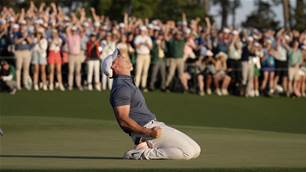
Feature Story: Moving the Needle

The Aussies at The Open
